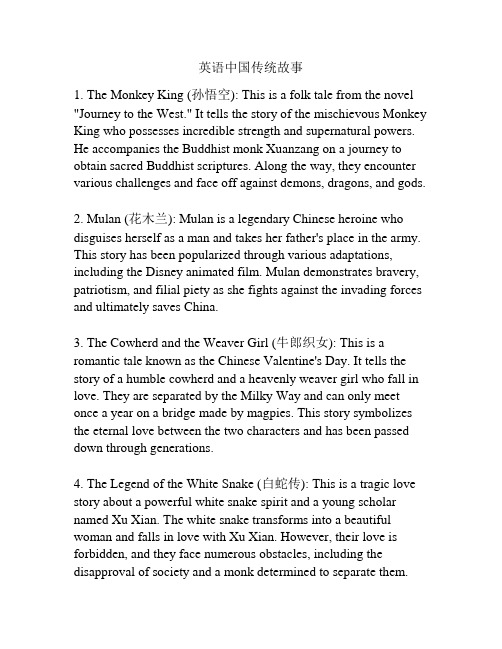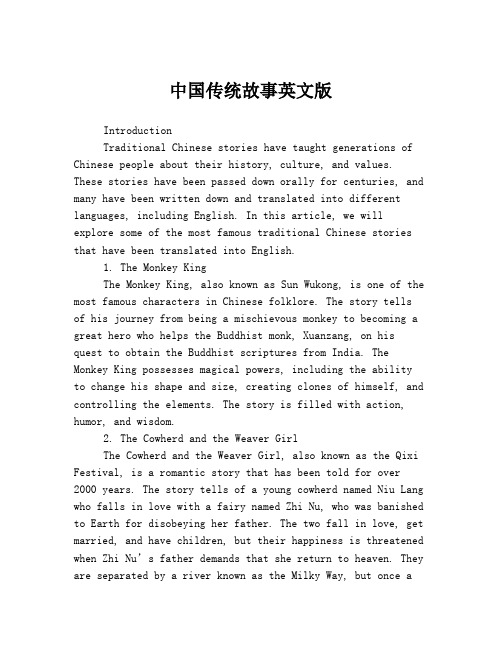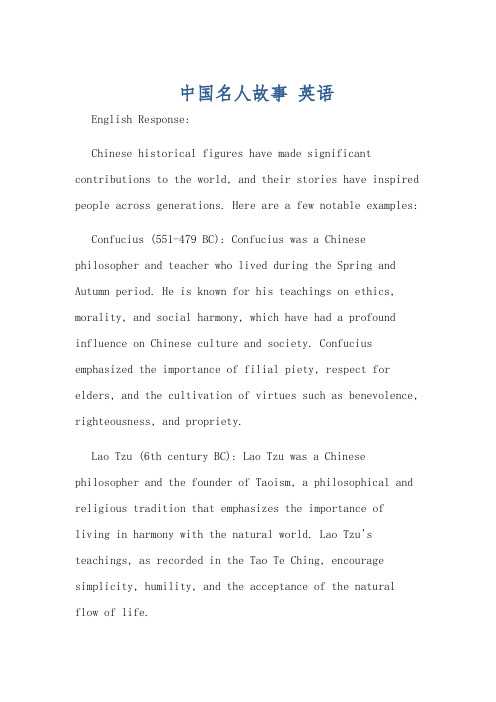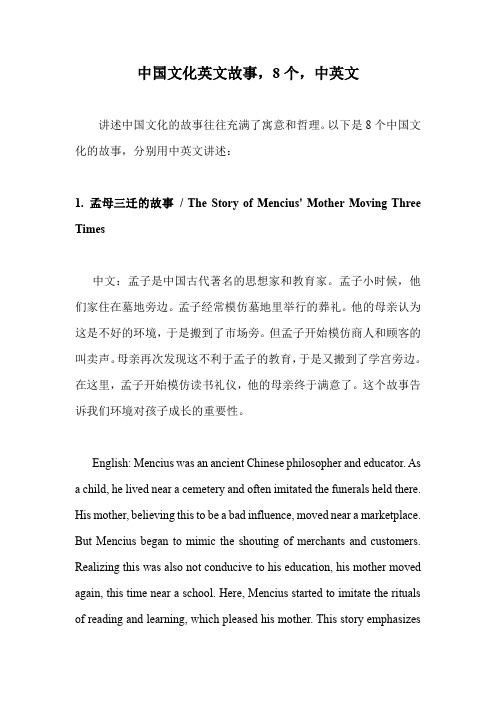中国传统文化经典名人故事【中英对照】
英语中国传统故事

英语中国传统故事1. The Monkey King (孙悟空): This is a folk tale from the novel "Journey to the West." It tells the story of the mischievous Monkey King who possesses incredible strength and supernatural powers. He accompanies the Buddhist monk Xuanzang on a journey to obtain sacred Buddhist scriptures. Along the way, they encounter various challenges and face off against demons, dragons, and gods.2. Mulan (花木兰): Mulan is a legendary Chinese heroine who disguises herself as a man and takes her father's place in the army. This story has been popularized through various adaptations, including the Disney animated film. Mulan demonstrates bravery, patriotism, and filial piety as she fights against the invading forces and ultimately saves China.3. The Cowherd and the Weaver Girl (牛郎织女): This is a romantic tale known as the Chinese Valentine's Day. It tells the story of a humble cowherd and a heavenly weaver girl who fall in love. They are separated by the Milky Way and can only meet once a year on a bridge made by magpies. This story symbolizes the eternal love between the two characters and has been passed down through generations.4. The Legend of the White Snake (白蛇传): This is a tragic love story about a powerful white snake spirit and a young scholar named Xu Xian. The white snake transforms into a beautiful woman and falls in love with Xu Xian. However, their love is forbidden, and they face numerous obstacles, including the disapproval of society and a monk determined to separate them.5. The Eight Immortals (八仙): The Eight Immortals is a folklore group of mythical characters in Chinese mythology. Each character possesses unique skills or abilities and represents a different virtue or power. The stories surrounding the Eight Immortals often depict their adventures and encounters with other legendary beings. They are revered as immortals who bring happiness, fortune, and longevity.These are just a few examples of traditional Chinese stories. Chinese culture has a rich heritage of folklore, mythical creatures, and legendary figures that continue to inspire and entertain people worldwide.。
中国古代有名故事英文版

中国古代有名故事英文版1. "The Butterfly Lovers" (梁山伯与祝英台)Once upon a time in ancient China, there were two young individuals named Liang Shanbo and Zhu Yingtai. Liang was a scholar from a poor family, while Zhu was a wealthy girl who disguised herself as a man to attend school. They became close friends and studied together for three years.During this time, Liang developed strong feelings for Zhu without realizing she was a girl. As they prepared to part ways, Zhu finally revealed her true identity and told Liang about her love for him. However, their love was forbidden due to their different social statuses.Liang later became seriously ill and passed away. On the day of his funeral, Zhu came to his grave and begged for it to open. As she laid down on the grave, it split open, and Zhu jumped into it, embracing Liang's body. The two spirits transformed into a pair of beautiful butterflies, never to be separated again.2. "The Cowherd and the Weaver Girl" (牛郎织女)In ancient China, there was a young cowherd named Niu Lang, who lived alone with a cow and an old buffalo. One day, the cow revealed itself to be an immortal being, and Niu Lang was granted a pair of magical cowhide shoes that could enable him to fly. Meanwhile, in the heavens, the heavenly king's seventh daughter, Zhinü, also known as the Weaver Girl, was tired of her divine duties. She decided to escape to Earth disguised as a human. There,she met Niu Lang, and they fell deeply in love. They got married and had two children.However, when the heavenly king discovered Zhinü's escape, he was enraged. He ordered his soldiers to bring her back to the heavens, but Niu Lang was determined to follow her. With the help of his magical cowhide shoes, Niu Lang chased after the soldiers.The heavenly king, moved by their love, allowed them to meet once a year on the seventh day of the seventh lunar month. On this day, magpies form a bridge across the Milky Way to reunite the Cowherd and the Weaver Girl, symbolizing their eternal love.3. "Journey to the West" (西游记)"Journey to the West" is a famous Chinese novel written during the Ming Dynasty. It tells the story of a Buddhist monk named Xuanzang and his disciples' journey to retrieve sacred Buddhist scriptures from India.The monk, accompanied by three infamous disciples – Sun Wukong, the Monkey King; Zhu Bajie, the pig demon; and Sha Wujing, a reformed river ogre – faces numerous challenges and battles against various demons and mythical creatures along the way.Throughout their treacherous journey, the monk and his disciples learn valuable lessons about friendship, loyalty, and personal growth. They overcome their flaws and become true heroes, contributing to the spread of Buddhism in China.These are just a few of the many beloved ancient Chinese stories. Each tale teaches important morals and values while capturing the cultural essence of ancient China.。
中国传统故事英文版

中国传统故事英文版IntroductionTraditional Chinese stories have taught generations of Chinese people about their history, culture, and values. These stories have been passed down orally for centuries, and many have been written down and translated into different languages, including English. In this article, we will explore some of the most famous traditional Chinese stories that have been translated into English.1. The Monkey KingThe Monkey King, also known as Sun Wukong, is one of the most famous characters in Chinese folklore. The story tellsof his journey from being a mischievous monkey to becoming a great hero who helps the Buddhist monk, Xuanzang, on his quest to obtain the Buddhist scriptures from India. The Monkey King possesses magical powers, including the abilityto change his shape and size, creating clones of himself, and controlling the elements. The story is filled with action, humor, and wisdom.2. The Cowherd and the Weaver GirlThe Cowherd and the Weaver Girl, also known as the Qixi Festival, is a romantic story that has been told for over 2000 years. The story tells of a young cowherd named Niu Lang who falls in love with a fairy named Zhi Nu, who was banished to Earth for disobeying her father. The two fall in love, get married, and have children, but their happiness is threatened when Zhi Nu’s father demands that she return to heaven. They are separated by a river known as the Milky Way, but once ayear on the seventh day of the seventh lunar month, birdsform a bridge to allow them to meet.3. The Legend of the White SnakeThe Legend of the White Snake is a tragic love storythat has been told for over 1000 years. It tells of a white snake spirit who falls in love with a human man named Xu Xian. The two get married and live happily until a Buddhist monk,Fa Hai, discovers that the snake is a demon and tries to separate them. In the end, the white snake spirit is defeated and turned into a stone.4. The Eight ImmortalsThe Eight Immortals is a collection of stories that tell of eight legendary figures who have supernatural powers andare revered in Chinese culture. They are said to have helped many ordinary people in times of need. Each immortal has hisor her own unique personality, powers, and teachings. The stories are filled with humor, wisdom, and lessons.ConclusionThese traditional Chinese stories are just a few examples of the rich cultural heritage of China. They have been passed down from generation to generation and continueto inspire and entertain people all over the world. Translations into English have helped to spread these stories even further, allowing more people to appreciate the beauty and wisdom of Chinese culture.。
中英文传统美德小故事

brother and sister,But must have a pear in the dish.Clever kong rong came up with a
办法,圆满的把梨分了。
solution, The perfect pear points.
寇准罢宴
KouZhun feast
寇准要过生日,官员们都来祝贺送礼。 KouZhun's birthday is coming, officials came to congratulate gift giving. 奶奶却向寇准忆起了原来的艰苦日子,提醒他不要过于铺张。 Grandma but to recall KouZhun original hard days, remind him not too stretched out. 寇准醒悟之下,取消了这个寿宴。 KouZhun disillusioned under, cancel the birthday.
202X
单击此处添加副标题
中华传统美德故事 The Chinese traditional virtue story
汇报日期
Kong Rong points pear 孔融分梨
在孔融小的时候, 叔叔曾经给他出了一个难题,让他把六个梨分给六
When Kong Rong was young, Uncle once gave him a challenge, Let him put six pears tosix,
唐代高僧玄奘去西天取经路过高昌国,高昌国国王为了提倡佛教,
极力挽留玄奘留在该国。但玄奘去西天的决心毫不动摇,
在高昌国传播了佛教之后,他又踏上遥遥西天路。
中国名人故事 英语

中国名人故事英语English Response:Chinese historical figures have made significant contributions to the world, and their stories have inspired people across generations. Here are a few notable examples: Confucius (551-479 BC): Confucius was a Chinese philosopher and teacher who lived during the Spring and Autumn period. He is known for his teachings on ethics, morality, and social harmony, which have had a profound influence on Chinese culture and society. Confucius emphasized the importance of filial piety, respect for elders, and the cultivation of virtues such as benevolence, righteousness, and propriety.Lao Tzu (6th century BC): Lao Tzu was a Chinese philosopher and the founder of Taoism, a philosophical and religious tradition that emphasizes the importance ofliving in harmony with the natural world. Lao Tzu's teachings, as recorded in the Tao Te Ching, encourage simplicity, humility, and the acceptance of the natural flow of life.Sun Tzu (6th century BC): Sun Tzu was a Chinese military strategist and philosopher who lived during the Spring and Autumn period. He is the author of the renowned treatise on military strategy, "The Art of War," which has been studied and applied in various fields, from business tointernational relations.Empress Wu Zetian (624-705 AD): Empress Wu Zetian wasthe only female emperor in Chinese history. She rose to power during the Tang Dynasty and is known for herpolitical acumen, administrative reforms, and the expansion of Buddhism during her reign.Zheng He (1371-1433 AD): Zheng He was a Chinese explorer and fleet admiral who led a series of voyages across the Indian Ocean, reaching as far as Africa and the Middle East. His expeditions were a testament to China's naval power and technological advancements during the Ming Dynasty.中文回应:中国历史上众多杰出人物的故事启发和影响了世界各地的人们。
二十四孝经典民间故事英文版带翻译

二十四孝经典民间故事英文版带翻译百顺孝为先,这是中国的传统美德之一,而中国民间有着二十四孝经典故事,今天店铺在这里为大家分享一些二十四孝经典民间故事,欢迎大家阅读!英文版二十四孝故事带翻译:江革行佣供母Jiang Ge was a man of Zibo, Kingdom Qi in the period of the East Han Dynasty. His father died when he was young and he was very pious to his mother.江革,东汉时齐国临淄人,少年丧父,侍奉母亲极为孝顺。
He carried his mother on his back to avoid war and met with bandits on several occasions.战乱中,江革背着母亲逃难,几次遇到匪盗They would kill him and he wept to say: "My mother is old and no one would support her." Seeing he was pious, the bandits let him go.贼人欲杀死他,江革哭告:老母年迈,无人奉养,贼人见他孝顺,不忍杀他。
Later he moved to Xiapi, Jiangsu and supported his mother by working as a laborer. He was poor and barefooted himself, but he supported his mother quite well.后来,他迁居江苏下邳,做雇工供养母亲,自己贫穷赤脚,而母亲所需甚丰。
He was recommended for his piety in the period of Emperor Ming and for his virtues and integrity in the period of Emperor Zhang and appointed general.明帝时被推举为孝廉,章帝时被推举为贤良方正,任五官中郎将。
中国传统文化故事 英文

中国传统文化故事英文1. The Story of NianOnce upon a time, there was a monster named Nian who lived in the mountains. Every year, on the first day of the lunar calendar, Nian would come down from the mountains and terrorize the nearby villages. The villagers would try to scare Nian away by making loud noises with firecrackers and wearing red clothes.One year, an old man arrived in the village and told the villagers that he could get rid of Nian for them. He said that Nian was afraid of the color red and loud noises, so the villagers should hang red lanterns and banners and set off firecrackers. The old man also said that Nian wasafraid of a boy who was born on the night of the lunar new year.The villagers followed the old man's instructions, and on the night of the lunar new year, Nian came down from the mountains as usual. However, when he saw the village covered in red decorations and heard the loud noises of firecrackers, he became frightened and tried to run away.Just then, a boy who was born on the night of the lunar new year appeared. Nian was terrified of the boy and ran backup to the mountains, never to be seen again.中文版:从前,有一只叫做年兽的怪兽住在山里。
中国文化英文故事

中国文化英文故事,8个,中英文讲述中国文化的故事往往充满了寓意和哲理。
以下是8个中国文化的故事,分别用中英文讲述:1. 孟母三迁的故事/ The Story of Mencius' Mother Moving Three Times中文:孟子是中国古代著名的思想家和教育家。
孟子小时候,他们家住在墓地旁边。
孟子经常模仿墓地里举行的葬礼。
他的母亲认为这是不好的环境,于是搬到了市场旁。
但孟子开始模仿商人和顾客的叫卖声。
母亲再次发现这不利于孟子的教育,于是又搬到了学宫旁边。
在这里,孟子开始模仿读书礼仪,他的母亲终于满意了。
这个故事告诉我们环境对孩子成长的重要性。
English: Mencius was an ancient Chinese philosopher and educator. As a child, he lived near a cemetery and often imitated the funerals held there. His mother, believing this to be a bad influence, moved near a marketplace. But Mencius began to mimic the shouting of merchants and customers. Realizing this was also not conducive to his education, his mother moved again, this time near a school. Here, Mencius started to imitate the rituals of reading and learning, which pleased his mother. This story emphasizesthe importance of the right environment for a child's growth.2. 守株待兔的故事/ The Story of the Man Who Waited for a Rabbit中文:这个故事讲的是一个农民在田里工作时,偶然有只兔子撞在树根上死了。
- 1、下载文档前请自行甄别文档内容的完整性,平台不提供额外的编辑、内容补充、找答案等附加服务。
- 2、"仅部分预览"的文档,不可在线预览部分如存在完整性等问题,可反馈申请退款(可完整预览的文档不适用该条件!)。
- 3、如文档侵犯您的权益,请联系客服反馈,我们会尽快为您处理(人工客服工作时间:9:00-18:30)。
【中英对照】中国传统文化经典名人故事Countries and Statesssic Anecdotes of Traditional Chinese CultureCla一、江山社稷1.大禹治水King Yu Tamed the FloodLong time ago, it was said that a deluge engulfed a huge area of land claimed many lives, so King Shun sent Yu to control the flood.Talking with seniors, Yu drew lessons from the past water-control experience. After the field survey, he made up a feasible plan. Then he led people to divert he floods, and during this time, though he actually passed by the door of his own home fo r three times, he didn’t go in.With 13-year persistent efforts under his leadership, 9 large rivers were finally dredged leading floods into the sea.While harnessing the floods, Yu, along with others, helped people rebuild their homes, fallowed lands and resumed production. In this way, he gave the common people a peaceful and contented life and achieved an immortal feat. At that time, to commemorate Yu the Great, the whole country was called “the City of Yu”; and for his feat, a mausoleum called “Yu Ling”was built in his honor by the later generations.2.贞观之治Reign of ZhenguanReign of Zhenguan (627-649 AD) was the golden and prosperous age of early Tang Dyna sty under the reign of Emperor Taizong, Li Shimin. He is typically considered one of the great est emperors in the whole Chinese history. Emperor Taizong’s reign was regaded ad the exemplary model against whicj the emperors of later generations were measured, and was considered required study for future crown princes. During his 23-year reign, the nat ion enjoyed stability and prosperity with the fourishing economy and powerful troops, and the people lived in peace.The emperor put people in the first place. He saw people as water and emperor as boat, and believed that the water could bear the coat and swallow it as well (民,水也;君,舟也。
水能载舟,亦能覆舟。
) Taking the downfall of Sui Dynasty as a negative example, Emperor Taizong appointed people on their merits and put them in the most suitable plac e, besides, he encouraged the free airing of views, accepted criticism with modesty and ga ve important position to the capable chancellors such as 房玄龄、杜如晦和魏征and so on. He made a peaceful society by takibg a series of policies, such as putting great emphasis on agriculture, cutting taxes upon farmers, taking the policy of recuperation and strictly enforcing thrift.Because his era name was Zhenguan, the grand times under his rule was generally recogn ized as Reign of Zhenguan, which laid a solid foundation for the peace and prosperity of later Tang Dynasty.After a long time deposition, feudal china ushered on the age of integration in such fields as politics, economy and culture during the 60-year reign of EmperorQianlong.3. Sleeping on Brushwood and Tasting Gall 卧薪尝胆In the Spring and Autumn Period, the State of Wu defeated the State of Yue, and took the King Gou Jian and his wife prisoner. For several years, Gou Jian laboured as salve in Wu. When he was released and returned to Yue, Gou Jian was determined to take revenge for losing his state. In order that he would nec\ver forget his humiliation, Gou Jian slept on a pie of brushwood and tasted gall before every meal in order to remind him of the shame and revenge. After ten years of careful preparations, he attacked and finally conquered the State of Wu.This idiom is used to describe inspiring oneself to accomplish an ambition.春秋战国时代,越国被吴国打败,越往勾践和妻子雅鱼被俘虏,咋吴国做了几年奴役。
后来勾践被放回越国,他立志要要报亡国之仇。
从此每天夜里睡在稻草上,每天吃饭前吃一个苦胆,以提醒自己不忘记过去的耻辱和仇恨。
经过十年艰苦奋斗,越过终于雪耻战胜吴国。
4.Jing Ke Assassinated the King of Qin 荆轲刺秦During the warring States Periods, the Prince of Yan sent a famous assassinator Jing Ke to kill the King of Qin.Jing Ke, together with another warrior,left for Qin with the head of 樊於期,a defector of Qin and the map of 督康,the most fertile land of Yan. Approaching the River Yi, Jing Ke sung a heartbroken song impassionedly, “ the River Yi is cold as the wind blows , the hero will never return after this departure.”Knowing that the envoy from yan brought both the head of 樊於期and the map of督康,the King of Qin felt very happy and ordered to meet Jing Ke at Xianyang Palace right away. Seeing the king, Jing Ke talked with ease. He handed the map to the king. No sooner had the king fully unrolled the map than Jing Ke took out the dagger h idden in the map and grabbed the king’s sleeve trying to stab him. The king tore the s leeve and jumped by the nearby screen heading out. Nobody could do anything to help. (难道都看傻眼了吗?汗⊙﹏⊙) The king managed to pull out his long sword and chopped off the left leg of Jing Ke who finally died at Qin’s palace.Though the assassination failed, Jing Ke took his place in the history book forever due to his bravery战国时期,燕国太子丹派著名刺客荆轲前往刺杀秦王。
